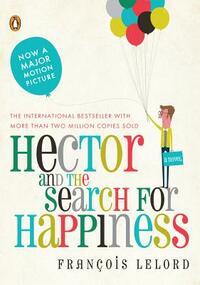You need to sign in or sign up before continuing.
Take a photo of a barcode or cover
I'd like to give this 3.5, but rounding up because I do believe the lessons and characters will stick with me, and possibly I will even come back to the book to review them from time to time. Reading other reviews, it sounds that some readers have been offended at the style in which this book was written and the characterization and generalities made along Hector's journey. I felt the opposite. This is a story about an age old tale: the search or happiness. The author chose to write in the style of a children's fable and used stereotypes and generalizations along the way. I read the story if Hector to be a satirical version in the face of so many search-for-enlightenment publications before it, rather than a philosophical, text-book road map to happiness.
In my mind, the author (portrayed as Hector), wrote a smart and humorous take on the age-old quest for happiness.
In my mind, the author (portrayed as Hector), wrote a smart and humorous take on the age-old quest for happiness.
Quit after 60 pages. The writing style was too simple and I found Hector to be obnoxiously naive.
This book is from Plucky's book club Plucky Reads. It is very short, and written in a very simple way. I kind of loved it. Especially after Beautiful Ruins - for both the simplicity and the outlook. It follows a psychiatrist named Hector, who is treating many patients who are unhappy, but do not know why. So he travels around the world in search of happiness. He meets many interesting people along the way and compiles a list of what happiness is and is not. It was easy to read, and fun. I appreciated how even in difficult situations the book was not depressing. It was more focused on the big picture, on gratefulness in struggle, and moving toward happiness. Again, something that I found lacking in Beautiful Ruins. This has also been made into a movie, and I can't wait to watch it. :)
I am not really sure how Hector and the Search for Happiness became a best-seller. In fact, I found it fairly offensive mostly because I found "Hector" (who, as far as I understand it, represents the author) unlikeable. Primarily, his relationship with women is troubling as they are either fetishized, exoticized or objectified throughout the novel--Hector is constantly noticing how attractive women are, and commenting on this impulse as uncontrollably male, bleck. Secondly, most of the people Hector meets along the way (particularly those who reside/live in the country he is visiting) are tokenized or stereotyped. Perhaps Lelord tried to give some dimension to humanity, as that was one of the purposes of the book, but I felt as though he fell considerably short. Lastly, Hector's approach to his search is clearly privileged, and I consistently sensed something very smug about Hector's character, even when he was intentionally trying not to be.
This novel was entertaining enough, especially considering how brief it is. But in truth, I didn't find it particularly enjoyable.
This novel was entertaining enough, especially considering how brief it is. But in truth, I didn't find it particularly enjoyable.
If this book were geared towards a younger audience with a child lead I might have enjoyed it more. As it is the lessons seemed far too simple although connecting the situations the lead went through was enjoyable.
The cutest and most memorable part of this book is the cover, which looks like the movie Up except Parisian. And if that's not a dream I don't know what is.
It's like 42 pages long, so theoretically I could probably reread it and review it in the span of a couple hours, but that sounds like the logical thing to do and therefore I won't do it.
I am nothing if not ruled by whimsy and cute book covers, in conclusion. And when I read this I thought it was fine but nothing to write home about.
Or a review about, apparently.
this is part of a series i sometimes remember i'm doing in which i review books i read a long time ago, because i'm a completist and annoying. also that's not really the right definition of completist.
It's like 42 pages long, so theoretically I could probably reread it and review it in the span of a couple hours, but that sounds like the logical thing to do and therefore I won't do it.
I am nothing if not ruled by whimsy and cute book covers, in conclusion. And when I read this I thought it was fine but nothing to write home about.
Or a review about, apparently.
this is part of a series i sometimes remember i'm doing in which i review books i read a long time ago, because i'm a completist and annoying. also that's not really the right definition of completist.
This book is a rare example where I found the movie to be far better than the book. I understand what the author was trying to do with the writing style but it didn't work for me. I'd recommend the movie over the book even if there were a few differences between the two. The movie executed the story in a more pleasant and more flowing way.
This is one instance where I can see the movie being better than the book. I'll update once I've seen the movie.
Hector is a really quick read, but it is a really great book! Its about a man who is on a journey to see if he can figure out the recipe to happiness. Written in a really fun and lighthearted way that keeps you turning the pages. Cute story.



